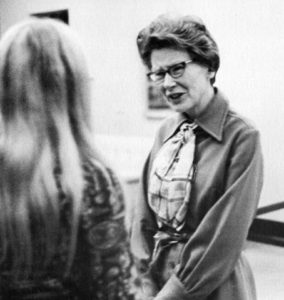
My interview with Sister Marie Augusta Neal took place in 1998 on a rainy afternoon in a quiet kitchen in Lowell, Massachusetts. Her spirit and what she achieved lit the room brightly. I have interviewed many extraordinary people over the years and been ehttp://library.emmanuel.edu/Archive/content/sr-marie-augusta-neal-snd-professor-sociology-1969-1970nriched by their stories. Sr. Marie Augusta Neal is certainly at or near the top.
One story she told me that was not included in the final publication was about her invitation to South Africa after she published the Sisters Survey described below. The white Sisters there – all white at the time – were caught between the apartheid system (1948 to 1994) ‘ in which they worked and their own sense of justice. They walked out of the white schools where they had taught for generations and opened new schools in the black neighborhoods. Often that also meant walking away from their families. It was an important step to end apartheid.
Often, teaching is a tool for learning. So it has been for Sister Marie Augusta Neal.
Sister Marie Augusta Neal entered the Sisters of Notre Dame in 1943, the year after she graduated from Emmanuel College. Ten years later, she took her perpetual vows. After a brief period of teaching in South Boston and Lawrence, she was encouraged to continue her education. From Boston College, she went to Harvard where she earned a doctorate in Sociology.
“I knew I wanted to become a nun since the first time I remember seeing a Sister, when I was six years old.”
“My father was a labor organizer for the railway clerks from 1923 to 1952. Often, he did his unionizing work on weekends and evenings. Except for the benefits of buying through the credit union, he received no compensation for his union work, nor did he seek any. Rerum Novarum, Pope Leo’s encyclical on the rights of the worker was his inspiration, although he did not know Leo was a Pope until we discovered it over our kitchen table when I was a student at Emmanuel. The values I brought to religious life were first developed in me by my father.”
“When I went back to school, I wanted to study what I had experienced in my own life to that time. My dissertation was on what kind of values move people to social change… what is noble altruism that moves people beyond self-interest?”
By the 1960’s, with the Vatican Council being called, the values of the Church began to evolve towards a more participatory structure, recognizing people’s right to participate in the decisions that effect them. This was very much in keeping with Sister Marie Augusta’s studies.
“Sister Mary Daniel Turner, an SND was executive secretary of the Leadership Conference of Women Religious (LCWR was previously named the Conference of Major Superiors of Women – CMSW). In the mid-1960’s, Sister Mary Luke Tobin, then president of CMSW called a meeting to discuss follow-up to a book entitled, The Changing Sister that she, Sister Mary Daniel Turner and several other Sisters had recently published.”
“At this meeting, I was asked to put a study together to understand the current thinking of Sisters throughout the world on the changes being introduced to the Church through the Second Vatican Council.”
“The survey was to consist of two parts. The first was a collection of data from each congregation – who were they, how many members did they have and so on. The second part was proposed as a random sampling of Sisters values and beliefs. The structure was based around my doctoral thesis published as, Values and Interest in Social Change.”
The CMSW board accepted the study as Sister Marie Augusta proposed it with one major change. Rather than a random sample, they asked that she undertake a survey of the entire population of 157,000 Sisters. She did so. The result was The Sisters Survey, the first comprehensive study of the attitudes of Catholic Sisters ever done. Over 90% of the Sisters contacted responded, each answering hundreds of questions. Forty Sisters who were also sociologists were organized to each take responsibility for 5,000 of the questionnaires. The questionnaires were distributed in December, 1966 and a report analyzing the responses was ready by the summer of 1967.
The knowledge of who you are offers the chance to decide who you will become. This was the value of The Sisters Survey to the congregations of women religious.
“When we did it, we didn’t know where The Sisters Survey was going. Its function was to determine the Sisters’ readiness for renewal as it was emerging from the Vatican Council.”
“We found that some Sisters were ready, some were not. However, the ones that were had great influence in their Chapter meetings, challenging the evils of poverty and racism. We found strong commitment to the charism of their congregations.”
Sister Marie Augusta sees change as an ongoing process. She describes the evolution of Sisters’ roles as “vows without walls”. While the cloister may have been removed, the commitment remains very much alive.
“I hope from the period of my lifetime in Notre Dame that we can see the continuation of the mission of our co-founders, Saint Julie and Francois Blin. I hope the way we live the vows brings us closer to their vision of fairness and equality, most especially for the poor of the world. That’s the unfinished business for us all.”
